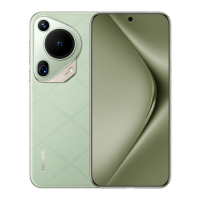Once the projection is successful, touch the capsule at the top of the phone screen. In
the Live view, perform the following steps:
• By default, banner for incoming calls, messages, and alarms, and Multi-
Window will only display on your phone instead of the Vision. To change the settings, touch
the blank area in the Live view and disable Hide in the displayed dialog box.
The Hide feature is only supported on certain products.
• Touch any blank area in the Live view. In the displayed dialog box, you can select whether
the audio will play from the phone or the Vision.
You can exit the projection using either of the following methods:
• Touch the
capsule at the top of the phone screen, and touch in the Live view.
• Swipe down from the upper left corner of your phone to display the panel, and
touch
.
Use Desktop Mode to Make Work More Convenient
In Desktop mode, your phone and the large-screen device work independently and can show
content. The content of a phone projected on the large-screen device is in a layout
similar to that of the computer desktop.
Once your phone screen is projected, touch the capsule at the top of the screen, touch
any blank area in the Live view, and touch Desktop mode in the displayed dialog box, to
begin using the large-screen device.
For example, you can edit a document on the large-screen device while chatting on your
phone. You don't need to worry about missing out on calls, or messages, as a
red dot will appear on the panel on the large-screen device to let you know.
Use Your Phone as a Touchpad
After your phone screen is projected to a large-screen device in Desktop mode, if no
keyboard or mouse is available, your phone can work as a touchpad to complete input
operations of a mouse and keyboard.
Touch the capsule at the top of the phone screen, touch any blank area in the Live view,
and touch Touchpad in the displayed dialog box. From there, feel free to:
• Use gestures as instructed to simulate mouse commands.
Settings
115

